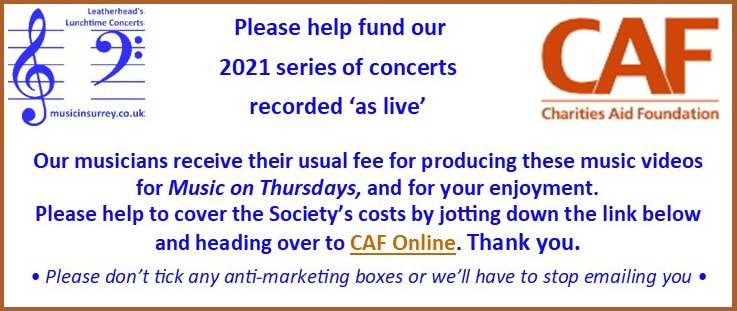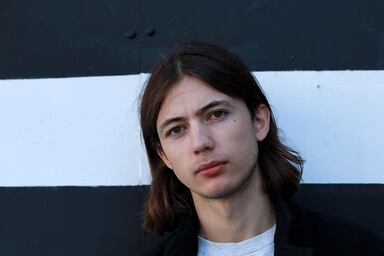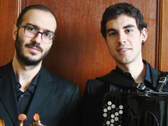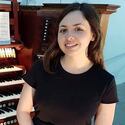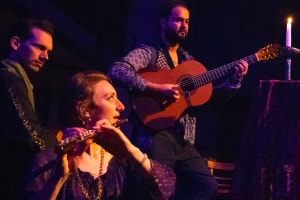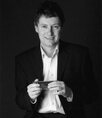Music on Thursdays - Online
Thursday 25th February 2021
2021 AGM Piano Concert
Thomas Ang
Composers:
Hans von Bülow (arr Liszt) ♦ Franz Liszt (arr Thomas Ang)
Amy Beach ♦ Samuel Coleridge-Taylor
Available: from early on Thursday 25th February
♫ ───────────────────────────────────
2021 AGM Piano Concert
Thomas Ang
Programme
Hans Guido Freiherr von Bülow (1830-1894)
arr Franz Liszt
Dante's Sonett (Dante Alighieri c1265-1321)
(Tanto gentile e tanto onesta pare)
So gentle and so dignified she appears (1874)
Franz Liszt (1811-1886)
arr Thomas Ang (b1991)
3 Petrarch Sonnets S270ii (1861) Francesco Petrarca (1304-1374)
Sonnet XLVII - Benedetto sia il giorno - Blessed be the day, the month, the year,
Sonnet CIV - Pace non trovo - I find no peace
Sonnet CXXIII - I' vidi in terra - I saw on earth angelic virtue
Amy Marcy Cheney Beach (1867-1944)
Four Sketches Op 15 (1892)
1 In Autumn
2 Phantoms
3 Dreaming
4 Fireflies
Samuel Coleridge-Taylor (1875-1912)
Suite from the Incidental Music to St Agnes's Eve (1912)
after the 1819 poem by John Keats (1795-1821)
1 That ancient Beadsman heard the Prelude soft
2 Her maiden eyes divine
3 Porphyro, Now tell me where is Madeline
Amy Marcy Cheney Beach (1867-1944)
Ballade in Bb, Op 6 (1894)
Concert duration: 55-60 minutes
Reminder: no AGM today. It has moved to May 20th, probably online.
|
We need your help to fund these concerts recorded 'as live' by our professional musicians |
|
Here is the link to Thomas Ang's AGM Piano Concert for Leatherhead Concert & Arts Society and Music on Thursdays Online Click or copy this: https://youtu.be/WLdIbXNyDMQ Or, click the videolink that follows (or appears on the right): |
|
♫ ───────────────────────────────────
AGM Piano Concert
Programme Notes by Thomas Ang
The art of arrangement in music is an old one, but the prominence of arrangements in the piano repertoire is almost single-handedly Liszt’s responsibility. In the middle of the 19th century, Liszt transcribed hours and hours of music for piano: all of Beethoven’s symphonies, hundreds of songs, chamber music by others, medleys of popular and operatic tunes, “improvisations” on folksongs, and even re-arrangements of his own music. His efforts in bringing others’ music into the burgeoning musical home were met with overwhelming success when coupled with his own fame as a superstar performer.
Not all of that multitude of arrangements has remained in the pianist’s canon. Liszt’s student, Hans von Bülow, is today remembered for his pianistic prowess rather than his compositional output (and also for the dubious honour of having his wife cheat on him with Richard Wagner), despite him being justly celebrated for his music in his time. Liszt’s arrangement of his student’s song exhibits all the hallmarks of his transcription technique, including dramatic climaxes, deft harmonic touches, and a luminous ending.
The importance of Liszt’s own Petrarch arrangements for piano has outstripped the impact of his original settings. In the early 1840s, Liszt chose three sonnets of Petrarch to set to music, and, in the original for high tenor, produced an astonishingly operatic set of songs. These were immediately arranged for piano, and those arrangements were further revised for inclusion in the seminal Années de Pèlerinage. The poems were recast for low voice in the 1860s and published at the end of his life, with a tangential relationship to the originals; my arrangements here aim to remain faithful to Liszt’s later piano style, with all its halts, interruptions, and empty space.
Amy Beach’s music has been unfairly pigeonholed as “pretty” by many commentators, purely for the reason that she wrote a sizable output of songs. Dismissed as parlour music for a very long time, her reputation is gradually being rehabilitated, with good recordings of most of her output, and increasingly prominent representation on the concert stage. Admired by the New England coterie in her youth, she was very careful with her craft, though she clung to her Romantic roots as she grew older and was seen as old-fashioned by the time of her death during the Second World War. She was also an extremely proficient pianist, writing music of great depth, and in these two early works it is possible to hear how well she has absorbed her influences (Chopin, Liszt, Brahms) to create a freshness of style wholly her own.
Samuel Coleridge-Taylor was born in Holborn at the tail end of the 19th century, and brought up in Croydon. He studied at the Royal College of Music and made the beginnings of a name for himself by 20. Published by Novello and promoted by Elgar, he was successful enough to make several trans-Atlantic tours, and was even received by Theodore Roosevelt in 1904 — an extremely high honour for the time. His music was very popular at the time, though his financial situation with music publishers was so poor that, after his death, musicians banded together to create the Performing Rights Society.
His death at 37 came far too early for a composer of his stature, and, after a few decades of fervent championship by his colleagues, he faded into obscurity after the Second World War. In my opinion, The Song of Hiawatha and the Clarinet Quintet are absolute must-hears, as are the beautiful Forest Scenes for piano and the Rhapsody on (confusingly enough to make Google searches difficult) Kubla Khan.
Not all of that multitude of arrangements has remained in the pianist’s canon. Liszt’s student, Hans von Bülow, is today remembered for his pianistic prowess rather than his compositional output (and also for the dubious honour of having his wife cheat on him with Richard Wagner), despite him being justly celebrated for his music in his time. Liszt’s arrangement of his student’s song exhibits all the hallmarks of his transcription technique, including dramatic climaxes, deft harmonic touches, and a luminous ending.
The importance of Liszt’s own Petrarch arrangements for piano has outstripped the impact of his original settings. In the early 1840s, Liszt chose three sonnets of Petrarch to set to music, and, in the original for high tenor, produced an astonishingly operatic set of songs. These were immediately arranged for piano, and those arrangements were further revised for inclusion in the seminal Années de Pèlerinage. The poems were recast for low voice in the 1860s and published at the end of his life, with a tangential relationship to the originals; my arrangements here aim to remain faithful to Liszt’s later piano style, with all its halts, interruptions, and empty space.
Amy Beach’s music has been unfairly pigeonholed as “pretty” by many commentators, purely for the reason that she wrote a sizable output of songs. Dismissed as parlour music for a very long time, her reputation is gradually being rehabilitated, with good recordings of most of her output, and increasingly prominent representation on the concert stage. Admired by the New England coterie in her youth, she was very careful with her craft, though she clung to her Romantic roots as she grew older and was seen as old-fashioned by the time of her death during the Second World War. She was also an extremely proficient pianist, writing music of great depth, and in these two early works it is possible to hear how well she has absorbed her influences (Chopin, Liszt, Brahms) to create a freshness of style wholly her own.
Samuel Coleridge-Taylor was born in Holborn at the tail end of the 19th century, and brought up in Croydon. He studied at the Royal College of Music and made the beginnings of a name for himself by 20. Published by Novello and promoted by Elgar, he was successful enough to make several trans-Atlantic tours, and was even received by Theodore Roosevelt in 1904 — an extremely high honour for the time. His music was very popular at the time, though his financial situation with music publishers was so poor that, after his death, musicians banded together to create the Performing Rights Society.
His death at 37 came far too early for a composer of his stature, and, after a few decades of fervent championship by his colleagues, he faded into obscurity after the Second World War. In my opinion, The Song of Hiawatha and the Clarinet Quintet are absolute must-hears, as are the beautiful Forest Scenes for piano and the Rhapsody on (confusingly enough to make Google searches difficult) Kubla Khan.
About Thomas Ang
Pianist Thomas Ang studied at the Royal Academy of Music with Hamish Milne and Diana Ketler, and at the Guildhall School of Music & Drama with Andrew West and Eugene Asti. He has won prizes for his performances of Beethoven, Frederick Delius, Arthur Bliss and the contemporary piano repertoire, and has been praised for his thoughtful and critical programming and excellent technique.
He has also earned recognition as a specialist in the music of Nikolai Kapustin, having played and conducted world premieres of his compositions in the UK, US, Singapore, Australia and Taiwan.
With a strong interest in contemporary music, Thomas has performed John Cage at the Purcell Room and Boulez at the Aldeburgh Music Festival. His piano duo (Duo Ex Libris) performed the complete non-sonata piano works of Boulez, including the two books of Structures in London; they have also played various recital programmes in Australia and around the UK and made multiple
appearances on Radio 3.
In other chamber groups he maintains a strong interest in unusual repertoire of the late Romantic, as well as mid-20th-century British music. He has worked with conductors such as Susanna Mälkki, Clement Power, Sian Edwards and Jonathan Berman as well as composers Oliver Knussen, John Adams and Nikolai Kapustin in playing their music. He has also played in classes by Stephen Hough, Pierre-Laurent Aimard, Imogen Cooper, Kathryn Stott and Yevgeny Sudbin among others.
Off the concert stage, Thomas works as a répétiteur and ballet pianist. He sometimes accompanies and improvises for silent film, appearing at various festivals and events. Thomas also plays the violin, and writes poetry and piano transcriptions of songs and symphonies.
A denizen of London, Thomas has spent lockdown days greatly expanding his sizable repertoire. Upcoming projects in 2021 include a lecture and two recitals for Pushkin House in March, a performance of Clara Schumann’s piano concerto, and working on Le nozze di Figaro with Opera Holland Park.
He has also earned recognition as a specialist in the music of Nikolai Kapustin, having played and conducted world premieres of his compositions in the UK, US, Singapore, Australia and Taiwan.
With a strong interest in contemporary music, Thomas has performed John Cage at the Purcell Room and Boulez at the Aldeburgh Music Festival. His piano duo (Duo Ex Libris) performed the complete non-sonata piano works of Boulez, including the two books of Structures in London; they have also played various recital programmes in Australia and around the UK and made multiple
appearances on Radio 3.
In other chamber groups he maintains a strong interest in unusual repertoire of the late Romantic, as well as mid-20th-century British music. He has worked with conductors such as Susanna Mälkki, Clement Power, Sian Edwards and Jonathan Berman as well as composers Oliver Knussen, John Adams and Nikolai Kapustin in playing their music. He has also played in classes by Stephen Hough, Pierre-Laurent Aimard, Imogen Cooper, Kathryn Stott and Yevgeny Sudbin among others.
Off the concert stage, Thomas works as a répétiteur and ballet pianist. He sometimes accompanies and improvises for silent film, appearing at various festivals and events. Thomas also plays the violin, and writes poetry and piano transcriptions of songs and symphonies.
A denizen of London, Thomas has spent lockdown days greatly expanding his sizable repertoire. Upcoming projects in 2021 include a lecture and two recitals for Pushkin House in March, a performance of Clara Schumann’s piano concerto, and working on Le nozze di Figaro with Opera Holland Park.
♫ ───────────────────────────────────
We hope you have enjoyed our AGM Piano Concert, which was
pre-recorded for Music on Thursdays by Thomas Ang
Watch your email and this website
for news of next Thursday's Vivaldi selection concert
pre-recorded for Music on Thursdays by Thomas Ang
Watch your email and this website
for news of next Thursday's Vivaldi selection concert
We continue with weekly video selection concerts until the end of June, with hopes of going live at Leatherhead Methodist Church from July 1st.
The first Thursdays in April, May and June will be further special recordings for Music on Thursdays. Watch out for news of the artistes who have accepted our lockdown challenge.
comments welcome: [email protected]
The first Thursdays in April, May and June will be further special recordings for Music on Thursdays. Watch out for news of the artistes who have accepted our lockdown challenge.
comments welcome: [email protected]
♫ ───────────────────────────────────
We need your help to fund these concerts
recorded 'as live' by our professional musicians
recorded 'as live' by our professional musicians
|
► Did you listen ?
►Did you remember to give afterwards ? Here is a further chance to do so If the concerts cover their costs we will be able to do more. Please donate now ! Many thanks to those who did donate during the Arts e-Live Festival. You set us all a great example ! |
♫ ───────────────────────────────────
These earlier concert recordings remain online
click on the buttons below to Listen (and watch) Again
and please tell your friends about them too !
click on the buttons below to Listen (and watch) Again
and please tell your friends about them too !
Oct 1st
|
Oct 8th
|
Oct 15th
|
Oct 22nd
|
Oct 29th
|
♫ ───────────────────────────────────────
♫ ───────────────────────────────────────
|
Concert Selections Still Available
for your listening on this Website: Please click on a title to go to the concert webpage • Marina Kan's AGM Piano Concert • Concert for St George's Day and Shakespeare's Birthday • Music on May Day • Music for VE Day 75th Anniversary • Piano à Deux - Linda Ang Stoodley & Robert Stoodley, 4 hands on 1 piano • Clocks & Cathedrals (musical clocks, that is) • Guitars & Friends - a guitar medley • Beethoven & Haydn String Quartets • Cello Tango - from solos to multi cellists • Organs of Paris ♥ Les Orgues de Paris • Flute Fest • Virtual Viola, hosted by Lynda Chang • Multi Piano - pianos from two to 12 at a time • From Sackbutt to Trombone • Harp Haven - our President's 100th Birthday Concert • Oboe Omnibus • Gentle Guitar • Music for Unusual Instruments • Viola da Gamba, hosted by Ibrahim Aziz • Music & the Military • Choral Music • Clarinet Compilation, hosted by Lynda Chang • The Voice, hosted by Lynda Chang • Beethoven 250, hosted by Peter Horsfield • Eddie Lee's Jazz on Thursday - recorded as live for Arts e-Live • Diphonon viola & accordion Duo - recorded as live for Arts e-Live • Marion Bettsworth & organ of St Michael's Highgate - recorded as live for Arts e-Live • CarmenCo - Carmen's Story in flute, voice & guitars - recorded as live for Arts e-Live • Phil Hopkins, harmonica, Stuart Whatton, piano, From JS Bach to film music composer John Barry - recorded as live for Arts e-Live • Musical Fireworks - a musical selection • Music of the Musicals up to 1960 - a musical selection |
♫ ───────────────────────────────────────
♫ ───────────────────────────────────────







